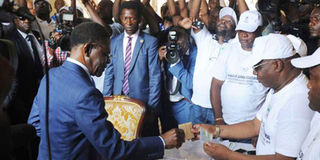As expected, Obiang wins E. Guinea poll with landslide

Equatorial Guinea incumbent president and candidate Teodoro Obiang Nguema arrives to cast his ballot at a polling station on April 24, 2016 in Malabo. Obiang Nguema has been re-elected for a fifth term. PHOTO | AFP
What you need to know:
Obiang, 73, garnered 93.7 per cent of the votes cast.
The leader was all along assured of an easy romp home.
Authoritarian rulers have also taken to scuttling opposition parties and marginalising them to the extent that they boycott elections.
Despite mounting opposition from different quarters, Africa’s longest serving leaders still insist on seeking multiple terms.
A case in point is Equatorial Guinea’s Teodoro Obiang Nguema, who has just been re-elected for a fifth term despite having ruled the tiny oil-rich nation since 1979, having come into power through a coup.
According to official results released by the country’s poll agency, Obiang, 73, garnered 93.7 per cent of the votes cast.
The leader was all along assured of an easy romp home.
The denizen of the African political scene will now be in office till 2023, by which time he would have ruled for a staggering 44 years.
Africa’s longest serving ruler has soldiered on despite claims by human rights groups that he is one of the continent’s most brutal dictators.
During the campaign period, he told his countrymen that failing to vote for him would be tantamount to rejecting peace.
LOOTING ACCUSATIONS
Despite his sense of indispensability, President Obiang has been accused, alongside his son, Teodoro ‘Teodorin’ Nguema Obiang, of plundering state coffers to buy property abroad.
That aside, in one of the most bizarre dynasty building arrangements in Africa, the younger Obiang incidentally serves as the vice-president.
His father has in recent times been resisting attempts by US authorities to seize his assets, denying charges that they were bought with embezzled money.
In spite of such claims, Obiang is deeply entrenched in power and does not show signs of leaving soon.
AFRICAN STRONGMEN
In a broader perspective, his wily retention of power followed similar performances by other veteran leaders who have ignored protests and insisted on seeking new terms.
Among them are the presidents of Uganda, Rwanda, Burundi and Congo Brazzaville, who have extended their tenure by changing their countries’ constitutions.
Also in the ranks is Chad’s President Idris Deby, who was recently re-elected for a fourth term.
As in the case of other countries ruled by men unwilling to relinquish power, there have been allegations of foul play during the Chad election held on April 10.
Like other veteran rulers, Deby has been accused of dominating his country’s political scene while also tightly controlling the entire election process to prevent effective monitoring by civil society.
Similar manoeuvres have been the stock in trade of most leaders seeking to remain in power. Among the most prevalent trick is the tendency to circumvent technology.
Authoritarian rulers have also taken to scuttling opposition parties and marginalising them to the extent that they boycott elections, even as sections of the citizenry lose faith in the ballot box.
Following such practices, former United Nations Secretary-General Kofi Annan recently warned the veterans that they were courting trouble.
“If a leader doesn’t want to leave office, if a leader stays on for too long,” Dr Annan warned during a recent meeting in Bahir Dar City, Ethiopia, “and elections are seen as being gamed to suit a leader and he stays term after term after term, the tendency may be the only way to get him out is through a coup or people taking to the streets.”
Given their fabled obstinacy and the fact that the tendency to hold onto power for as long as possible seems to be the norm, to many veteran African leaders Dr Annan’s warning was like the Biblical voice of a man shouting in the wilderness.





